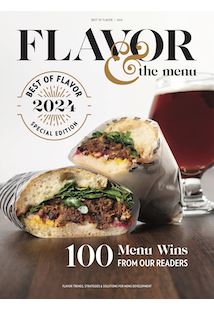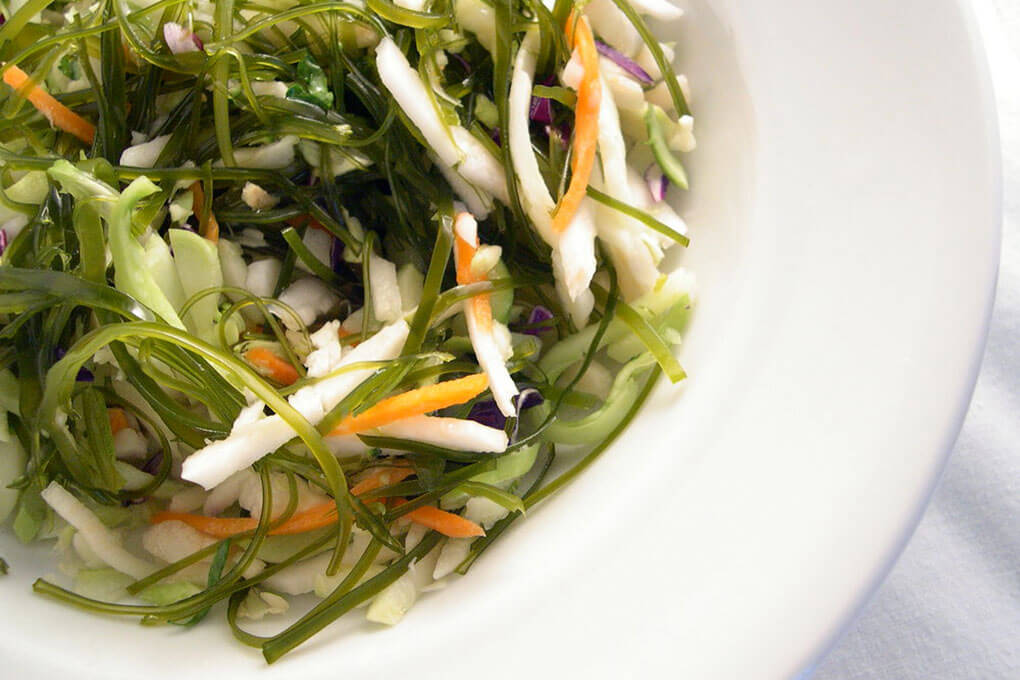Seaweed—becoming known in the culinary world as “sea greens” or “sea vegetables”—has probably been on your trend radar, showing up as an emerging menu opportunity. As savvy consumers begin to appreciate the nutritional attributes and unique flavors, seaweed is poised to serve up long-term menu-development play. In fact, the global commercial seaweed market is expected to grow to $22.1 billion by 2024, according to Grand View Research, reported by Seafood Source.
The momentum is further strengthened by the blossoming excitement around domestic seaweed farmers, taking place on both coasts—such as Ocean Approved based in Maine and Monterey Bay Seaweeds in Moss Landing, Calif. Along with fresh or frozen products and expanded value-added product lines, these companies are opening up opportunities for restaurant brands to align with a new “sea to table” sustainability message.
 Lemonade
Lemonade Seaweed and furikake add contrasting flavor and texture to Lemonade’s Spicy Fin Bowl with spicy ahi tuna.
Some restaurants are already in on the seaweed game, offering up a seaweed salad, for instance, but we’re seeing more experimentation with a broader range of products, proving its potential as a high-impact ingredient. Houseman in New York steams fish with seaweed butter while Hip Vegan in Ojai, Calif., uses sea greens in its Wagamama rice bowl, along with avocado, sweet potato and miso dressing.
Leveraging seaweed in creative applications (breakfast, brunch, sandwiches, bowls, and even beverages) can help build menu interest and entice modern consumers, while enhancing menu items with a functional foods halo.
These powerhouse ingredients can strengthen and broaden your menu via multiple connection points:
- Wellness
- Functional food and personalized nutrition
- Clean eating
- Flavor
- Diversity of seaweed via dried, raw, pickled, broths, spice blends and more
- Global and regional cuisine features
- Experiential Eats
- Memorable color, flavor and texture appeal
- Story/origin of food; tout domestic sourcing
- Trend & Consumer Influences
- Plant-based movement and flexitarian lifestyles
- Discovery of new ingredients along with the self-education it evokes
What follows are idea generators aimed at demonstrating the merits and versatility of seaweed (and algae), serving as an introduction for an easy pathway of implementation across the menu.
 High Street on Hudson
High Street on Hudson New York’s High Street on Hudson offers Seaweed Bucatini, demonstrating big opportunities for sea greens.
Furikake (seasoning with dried seaweed)
- Add to sautéed mushrooms or roasted root vegetables to deepen umami
- Sprinkle over fresh avocado slices to counterbalance the creaminess
- Replace red pepper flakes on cheese pizza slices
- Blend into tempura batter for a Japanese fish and chips (pair with crispy lotus and taro root duo as chips)
- Toss either sweet teriyaki- or garlic butter-glazed fried chicken wings or chicken strips with furikake
Togarashi (spice blend with seaweed)
- Toss with french fries, tater tots, tortilla chips or housemade potato chips (plus grated Parmesan) for a bright flavor contrast
- Spice up classic buttermilk ranch with a mix-in of this beautiful seasoning
- Pump up a citrus vinaigrette or fresh herb oil with heat sophistication
Dulse (red seaweed)
- Add savory complexity to classic tomato sauce, cream sauces or soups
- Enrich a vegetarian noodle bowl by incorporating large dulse flakes into a broth or sauce
Kelp (brown seaweed)
- Blend into basil pesto to re-position it as a seaweed pesto
- Mix into mayonnaise and use as a sandwich spread
- Stir into guacamole, hummus or bean dips for boosted nutrition
- Create a kelp broth to use as a base for endless applications, such as braising vegetables
- Pickle and top on freshly shucked oysters
Arame (brown kelp)
- Chop and create a dynamic compound butter for topping grilled fish, as a finishing touch in a scampi, glaze on vegetables, or feature as a seaweed butter spread for signature bread service
- Infuse into oil and use (along with a mignonette) with oysters on the half-shell
Nori (seaweed sheets)
- Blend/dissolve dried nori sheets into nut butter, along with toasted sesame seeds and chopped dried apples for a savory/sweet take on a nut butter spread
- Place a partial sheet of dried nori in a cheese and crabmeat omelet, then roll up and slice
Goma Wakame & Hijiki Seaweed (green and brown seaweeds)
- Incorporate (whole or chopped) as a featured component in grain bowls and lettuce salads
- Toss (whole or chopped) with an edamame-cauliflower rice stir fry, drizzle with sweet Thai chile sauce and top with an over-easy egg
- Chop and mix into traditional potato salad for premium messaging

Chez Pascal in Providence, R.I., showcases pickled Ocean Approved kelp atop its Island Creek oysters.










